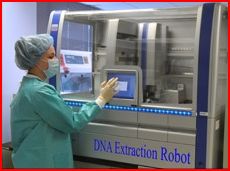Cool.
Harris County officials on Tuesday broke ground on a new forensic genetics laboratory, to open later this year, which will let county scientists test DNA evidence in a growing number of cases.
The 15,000-square-foot facility, on Holcombe in the Texas Medical Center, could be considered the little brother of a new Institute of Forensic Sciences the county plans to begin building elsewhere in the Medical Center late next year. Commissioners Court on Tuesday approved $7 million for design work on the nine-story tower that will allow the institute to expand the rest of its services, including autopsies.
[…]
Dr. Luis Sanchez, the chief medical examiner, said the expansion also will let his staff further an effort with Baylor College of Medicine to investigate genetic causes for sudden death among infants and young adults, as well as add more fellowships for doctoral students.
See here and here for some background. What really interested me about this story, other than the chance to post that DNA robot picture again, was this:
The county’s move to expand its lab comes as city leaders look at plans to spin off Houston’s troubled crime lab. Mayor Annise Parker has proposed removing the city’s crime lab from the Houston Police Department and placing it under an appointed board.
Parker has said she welcomes county participation in her plan, but that seems unlikely.
County Judge Ed Emmett has called the idea a “nonstarter.”
That’s a much more pessimistic tone than what we had heard before from Judge Emmett. In February, when Mayor Parker unveiled her plan for the city’s crime lab, the Chron quoted Emmett as follows:
County Judge Ed Emmett said that although the city and county are on separate tracks right now, Parker’s proposal ultimately could make it easier for the two governments to come together.
“By having the LGC, it opens up more options for how the city can approach forensic science, including partnering with the Institute of Forensic Sciences,” Emmett said.
I was curious to know if something had changed, so I asked him. Judge Emmett told me that he didn’t intend for that to sound particularly negative. He and Mayor Parker have talked about this, many times and on friendly terms. He said it basically comes down to this: The city was approached several times, but didn’t want to sign on with the county when the money was carved out to build the new IFS lab, so the county finally just went forward at that time. The Mayor then unveiled her plans calling for a lab overseen by an appointed board. That was pretty much where the two sides kind of agreed to go their separate ways, because the county was not about to spend its money and build a new state-of-the-art lab and then have it overseen by a board appointed by the city and its interests. Judge Emmett said that as it is, the county’s lab is reviewed, overseen and accredited by six separate accrediting agencies.
He went on to add that this doesn’t mean there may not be some sort of agreement between the city and the county in the future, but it’s safe to say that the county is going forward with its own plans at this point. The city is welcome to join if it and the county find a format with which they are comfortable, but the county is not going to cede supervision of its nationally recognized forensics facilities to another government agency.
This is me speaking now. My interpretation is that the sticking point is the composition of the local government corporation, which would be appointed by the Mayor and approved by Council. I would presume that this is not necessarily the last word in how that is done, but even if it is there’s no reason to believe that the LGC couldn’t contract some operations to the county, or that there couldn’t be some kind of joint venture for some aspect of this. Judge Emmett may be closing one door, but there are still windows open. As I’ve said before, it makes too much sense for there not to be some kind of collaboration, it’s just a matter of what form it takes.

